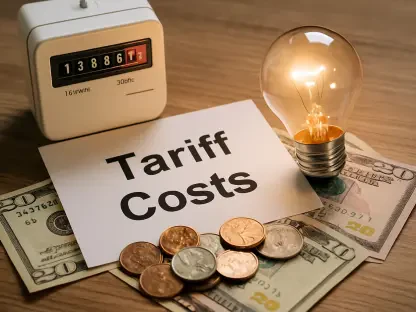What happens when a giant like Amazon, a company that shapes how millions shop online, gets hit with a staggering $2.5 billion penalty? This isn’t just a fine; it’s a seismic shift in the digital marketplace, exposing cracks in the trust consumers place in subscription services. Picture millions of Prime members, lured by fast shipping and streaming perks, only to find themselves ensnared in a web of deceptive enrollment and frustrating cancellations. This historic settlement with the Federal Trade Commission (FTC) in 2025 isn’t just about one company—it’s a wake-up call for the entire e-commerce world.
A Historic Penalty Shaking the Retail Giant
This $2.5 billion settlement stands as the largest civil penalty for a rule violation in FTC history, dwarfing previous fines and sending shockwaves through online retail. Amazon, a titan with over 200 million Prime members globally, faces a reckoning that challenges its unchecked dominance. The sheer scale of this penalty—split between a $1 billion fine to the FTC and $1.5 billion in consumer refunds—underscores a critical message: no corporation is above accountability when it comes to consumer protection.
Beyond the numbers, this case reveals deeper flaws in how subscription models operate in the digital age. Allegations of tricking users into Prime memberships and creating barriers to cancellation have tarnished Amazon’s image as a customer-first platform. The fallout could force a reevaluation of practices across the industry, as competitors watch closely to see how this penalty reshapes the rules of engagement.
Why Every Online Shopper Should Care
For the average shopper, Amazon Prime is synonymous with convenience—two-day shipping, exclusive deals, and endless entertainment for an annual fee of $139. Yet, beneath this allure, the FTC uncovered a troubling pattern of deception affecting millions. Claims suggest that unclear checkout buttons enrolled unsuspecting customers, while a convoluted cancellation process kept them locked in, often against their will.
This isn’t merely Amazon’s story; it reflects a broader struggle in e-commerce where consumer rights clash with corporate profits. With online shopping now a daily habit for many, transparency has become a non-negotiable demand. Shoppers must recognize that every click carries potential hidden costs, making this settlement a crucial reminder to stay vigilant in the digital marketplace.
Breaking Down the Allegations and Settlement Terms
At the core of this landmark case are specific accusations against Amazon for violating the Restore Online Shoppers’ Confidence Act. The FTC alleges that the company used deceptive tactics, such as ambiguous transaction prompts during checkout, to enroll users in Prime without clear consent. This practice reportedly misled countless customers into recurring charges they didn’t intend to accept.
Equally damning is the claim around cancellations, internally nicknamed “Iliad” by Amazon—a nod to the epic struggle of the Trojan War. The process forced users through a frustrating maze of pages to unsubscribe, deterring many from leaving. Under the settlement, Amazon must pay out refunds to over 30 million affected customers, with automatic payments of up to $51 for some, covering enrollments from 2025 onward. This financial remedy, paired with mandated changes to enrollment clarity, aims to prevent future exploitation.
Perspectives from Key Players and Experts
The FTC’s stance is unwavering, with officials asserting that Amazon’s swift settlement came after recognizing the strength of the case against it. Chris Mufarrige, director of the Bureau of Consumer Protection, emphasized that this outcome serves as a deterrent to other tech giants exploiting consumer trust. The agency views this as a triumph for regulatory oversight in an era of digital dominance.
Amazon, however, paints a different picture. Spokesman Mark Blafkin maintains that the company prioritizes clear processes for both sign-ups and cancellations, denying any intentional wrongdoing. Framing the settlement as a practical move to avoid lengthy litigation, Amazon insists its focus remains on customer value. Meanwhile, consumer advocates see this as a potential turning point, drawing parallels to Meta’s $5 billion privacy fine in 2019, suggesting that stricter standards for subscription services may soon become the norm.
Steps Forward for Consumers and Businesses
For those impacted by Amazon’s practices, actionable relief is on the horizon. Customers enrolled in Prime through questionable means since 2025 can expect automatic refunds or file claims through a forthcoming process managed by the company. Beyond compensation, shoppers are encouraged to scrutinize subscription terms during online purchases, ensuring they understand what they’re agreeing to before finalizing transactions.
Businesses, on the other hand, face a clear directive from this settlement. Compliance with laws like the Restore Online Shoppers’ Confidence Act is no longer optional—companies must prioritize explicit consent and simplify cancellation options. Regular audits of user interfaces can prevent similar disputes, fostering trust in a landscape where digital scrutiny grows sharper by the day. This moment offers a chance to align profitability with ethical practices, setting a new standard for the industry.
Reflecting on a Landmark Moment
Looking back, the $2.5 billion settlement between Amazon and the FTC marked a defining chapter in the fight for consumer rights in online retail. It exposed vulnerabilities in subscription models that millions had taken for granted, holding a corporate giant accountable for practices that prioritized revenue over fairness. The resolution brought not just financial relief to affected users but also a renewed focus on transparency across e-commerce platforms.
As the dust settled, the path forward became evident: consumers gained tools to demand clarity with every online interaction, while businesses faced pressure to rethink deceptive strategies. This case laid the groundwork for potential legislative reforms, ensuring that digital shopping evolves into a space of trust rather than traps. The lessons learned in 2025 continue to echo, urging all stakeholders to champion a fairer, more accountable online marketplace.









